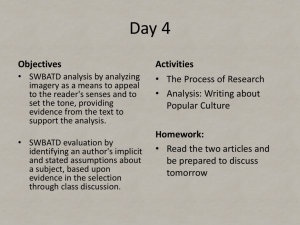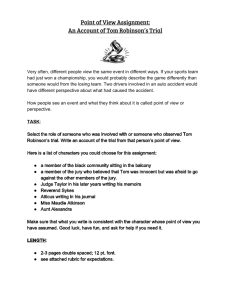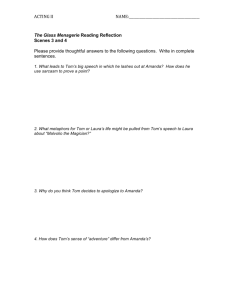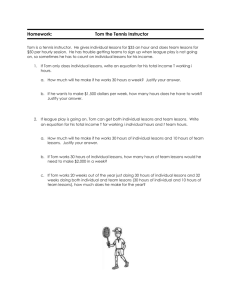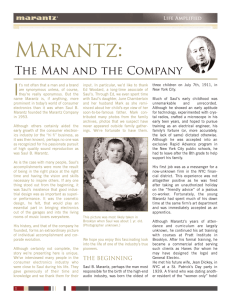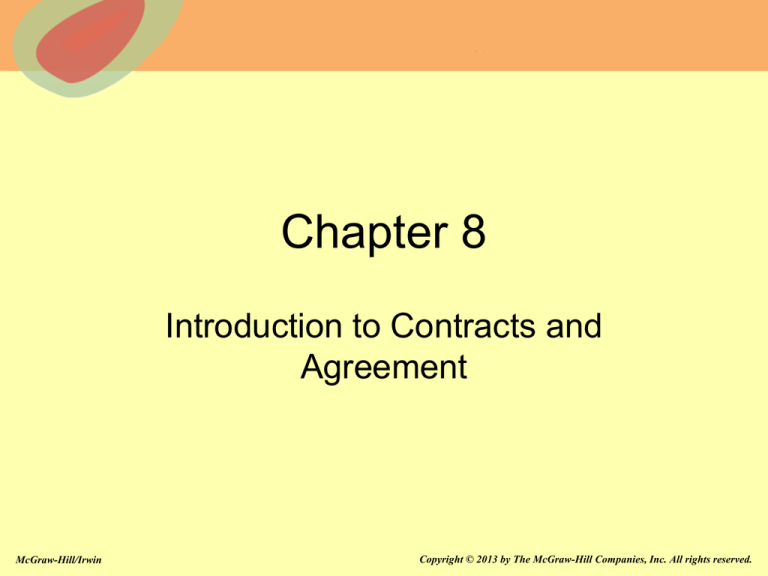
Chapter 8
Introduction to Contracts and
Agreement
McGraw-Hill/Irwin
Copyright © 2013 by The McGraw-Hill Companies, Inc. All rights reserved.
Chapter 8 Case Hypothetical
Zsa Zsa Hilton, a wealthy socialite living in Beverly Hills, was frantic. Her best friend in
the world was her pet poodle Caboodles, and Caboodles had been missing for three (3)
days. Having searched her estate exhaustively, Zsa Zsa decided that her next best
option was to post a reward for her beloved Caboodles.
Zsa Zsa carefully prepared a poster advertising a reward for the return of her pet. The
heading of the poster exclaimed “Please find Caboodles—Reward--$25,000!!!” Below the
heading was a color “glamour shot” of the animal and Zsa Zsa’s contact information,
including her address and cell phone number. After soliciting the assistance of her butler,
her maid, and her best friend Eva Ritchie, Zsa Zsa displayed and distributed one
thousand of the posters throughout the greater Beverly Hills metropolitan area.
Later in the week, Dane “Bulldog” Sheppard showed up at Zsa Zsa’s front door. When
she answered the door chime, Dane said “I am pleased to meet you, Ms. Hilton. I saw
your ad for the return of your lost poodle, and I am your man. I will find him, Ms. Hilton,
and let me say in advance that I really appreciate the $25,000 bounty, um, reward
money!”
Is there a contract between Dane “Bulldog” Sheppard and Zsa Zsa Hilton?
8-2
Chapter 8 Case Hypothetical
Carter Morley and Erena Erickson live side by side in town homes joined together by a shared wall.
Both residences are in need of new exterior paint. On Monday, Morley calls a painter, Tom Sizemore,
having selected his name from the classified section of the phone directory. Morley describes his
address, the physical dimensions and structure of his home, and he agrees with Sizemore that the
work will be performed that Friday. Sizemore estimates that with his crew of five, and given the
relatively small size of the home, the work will only take one day to complete. Morley advises that
although he will have to work a fourteen-hour day on Friday, he would like to have the work completed
in his absence. In passing conversation with his neighbor Erickson, Morley advises her of his “home
improvement” plans.
Early Friday morning, Sizemore and his team arrive at the address, but by mistake, they begin work on
Erickson’s side of building. Although Erena is home, she does not object to the work, nor does she
inform Sizemore and his crew of the mistake. Midway through the day, she offers them freshsqueezed lemonade and ham sandwiches, and they heartily accept.
Upon completion of the work at 7:00 p.m. Friday evening, Sizemore knocks on Erena’s door and asks
if “the man of the home” is present, that he would like Morley to review the work and pay the agreedupon price for the work. Erena chuckles, and “breaks the news” that the painting crew has made a
mistake, one to her benefit. Erickson proclaims “I do not owe you one dime, because you do not have
a contract with me; I will give you ten minutes to remove yourself and your materials from my property,
or I will call the police.”
Do Erickson and Sizemore have a contract? If so, why? If not, are there any other theories of recovery
available to Sizemore?
8-3
Chapter 8 Case Hypothetical
Tom Garrity, Bill Simmons, and Edward Yang were close friends. Their friendship had developed over their mutual love
for vintage stereo equipment, and the three often spent hours with each other, admiring their electronic collections,
monitoring online auctions for vintage receivers and speakers, and playing music. On several occasions, Edward
expressed his interest in a particular stereo receiver Tom owned, the classic Marantz Model 4400. Edward often told
Tom that if he ever wanted to sell the receiver, he would like to be first considered as the buyer.
Last Saturday morning, Tom and Bill were at Tom’s house. During their conversation, Tom stated “Bill, I know how
much Edward loves my Marantz 4400 receiver, and I have too much stereo equipment in the house. In fact, Sarah
(Tom’s wife) has given me an ultimatum: Either a good portion of the receivers and speakers go, or I go! I have
decided that I will sell my Marantz 4400 to Edward for $200. It’s worth at least $600, and it’s the only Marantz receiver
that I own, but I’ve decided that I would like to continue to live in this house, and my wife hasn’t given me any other
options except to sell some of this stuff!”
Later that day, Edward appeared at Tom’s house. Edward enthusiastically proclaimed “Tom, Bill told me about your
offer, and I will take the Marantz 4400 for $200. This is the classic receiver as far as I am concerned, and I am forever
grateful to you! I promise I will take care of it, and you can have lifetime visitation rights! Oh, and please tell Sarah I said
‘thanks’!”
Tom was perplexed. After his conversation with Bill on Saturday morning, he had decided to keep the Marantz 4400,
and sell all of his other receivers. He knew that his next statement would test Edward’s friendship: “Edward, I’m sorry,
but I have decided not to sell the Marantz 4400. We can discuss selling any of my other receivers, but the Marantz is
‘off-limits’.” Edward’s reply? “We have an agreement, Tom. You made me an offer, and I accepted your offer. Here is
the $200. Where is the receiver?”
Is there a contract between Tom Garrity and Edward Yang?
8-4
Chapter 8 Case Hypothetical
Keith Avondale is in the market for a new “big screen” flat-panel television. While
reviewing the Sunday newspaper, he notices a full-page advertisement from “Transistor
Town.” The advertisement includes a 45-inch flat-panel television for $299. Surprised by
the remarkably low price, and eager to purchase his new luxury item, Avondale makes
plans to “open the store” on Monday morning.
Avondale is the first customer to arrive at the store on Monday, waiting outside when the
front doors open. He rushes into the store and announces to the first sales
representative he sees, “I will take a 45-inch flat-panel television for $299!”
The sales representative immediately refers Avondale to the store manager, who directs
Avondale to his office. The store manager explains to Avondale that the advertisement
was an unfortunate mistake, resulting from miscommunication between Transistor Town
and the newspaper publisher. The manager goes on to say that the intended advertise
price was $2,999, but that he would be willing to sell the described television to Avondale
for $2,449, Transistor Town’s cost for the television. Avondale objects, demands that
Transistor Town sell the television for $299, and informs the store manager that his
brother is a trial lawyer.
Who wins?
8-5
Contract
Definition: A set of legally
enforceable promises
8-6
Elements Required For Contract
Formation
• Agreement (Offer and Acceptance)
• Consideration (Bargained-For Exchange)
• Contractual Capacity (Legal Ability to Enter
Into Binding Contract)
• Legal Object
8-7
Defenses to Enforcement of Contract
• Lack of genuine assent (fraud, duress,
undue influence, misrepresentation)
• Lack of proper form requirements
(statute of frauds writing requirement)
8-8
Sources of Contract Law
• State common law
• The Uniform Commercial Code
(Article 2)
-Governs contracts for the sale of
goods
8-9
Classification of Contracts:
Bilateral or Unilateral
• “Bilateral” Contract: Exchange of
promises
• “Unilateral” Contract: Promise in
return for performance of act
8-10
Classification of Contracts:
Express or Implied
• “Express” Contract: Based on written or
spoken words
• “Implied” Contract: Based on conduct or
actions
-“Quasi-Contract” (“Implied-in-law” contract):
Imposed in certain cases to avoid unjust
enrichment, even if all elements of contract
formation not satisfied
8-11
Classification of Contracts:
Valid, Void, or Voidable
• “Valid” Contract: All elements of contract
formation satisfied
• “Void” Contract: Illegal purpose/subject
matter; unenforceable
• “Voidable” Contract: One or both parties
can withdraw from contract
8-12
Classification of Contracts:
Executed or Executory
• “Executed” Contract: All terms of
contract fully performed
• “Executory” Contract: Some duties
under contract not performed by
one/both parties
8-13
Classification of Contracts:
Formal or Informal
• “Formal” Contract: Must meet special form
requirements
-Examples: Contracts under seal,
“recognizances,” letters of credit, and
negotiable instruments
• “Informal” Contract: No formalities required
in making; a “simple” contract
8-14
The Agreement: Offer and
Acceptance
8-15
Elements of a Valid Offer
• Manifestation of offeror’s intent to be bound
-Intent determined by objective, “reasonable
person” standard
-Preliminary negotiations and advertisements do
not constitute offers
• Definite and certain terms (including subject
matter, price, quantity, quality, and parties)
• Communication of offer to offeree (or
offeree’s agent)
8-16
Auctions
• Auction With Reserve
-Seller merely expresses intent to receive
offers
-Auctioneer (as representative of seller) may
withdraw item from auction at any time before
“hammer falls”
-Before hammer falls (signaling acceptance of
offer), bidder/offeror may revoke bid
• Auction Without Reserve
-Seller must accept highest bid
8-17
Termination of Offer
•
•
•
•
Revocation by Offeror
Rejection by Offeree
Death/Incapacity of Offeror
Destruction/Subsequent Illegality of
Subject Matter of Offer
• Lapse of Time/Failure of Condition(s)
Specified in Offer
8-18
Acceptance
• Represents offeree’s intent to be bound by terms of
offer and resulting contract
• Silence generally does not constitute acceptance
• Terms of acceptance must be identical to terms of
offer (“Mirror-Image” Rule)
• Effective when communicated by offeree to offeror
• If no method of communicating acceptance specified
in offer, any reasonable means of acceptance
effective (Examples: telephone, mail, fax, e-mail)
8-19
The Mailbox Rule
Acceptance by mail effective when
placed in mailbox; however, revocation
of offer effective only when received by
offeree
8-20



